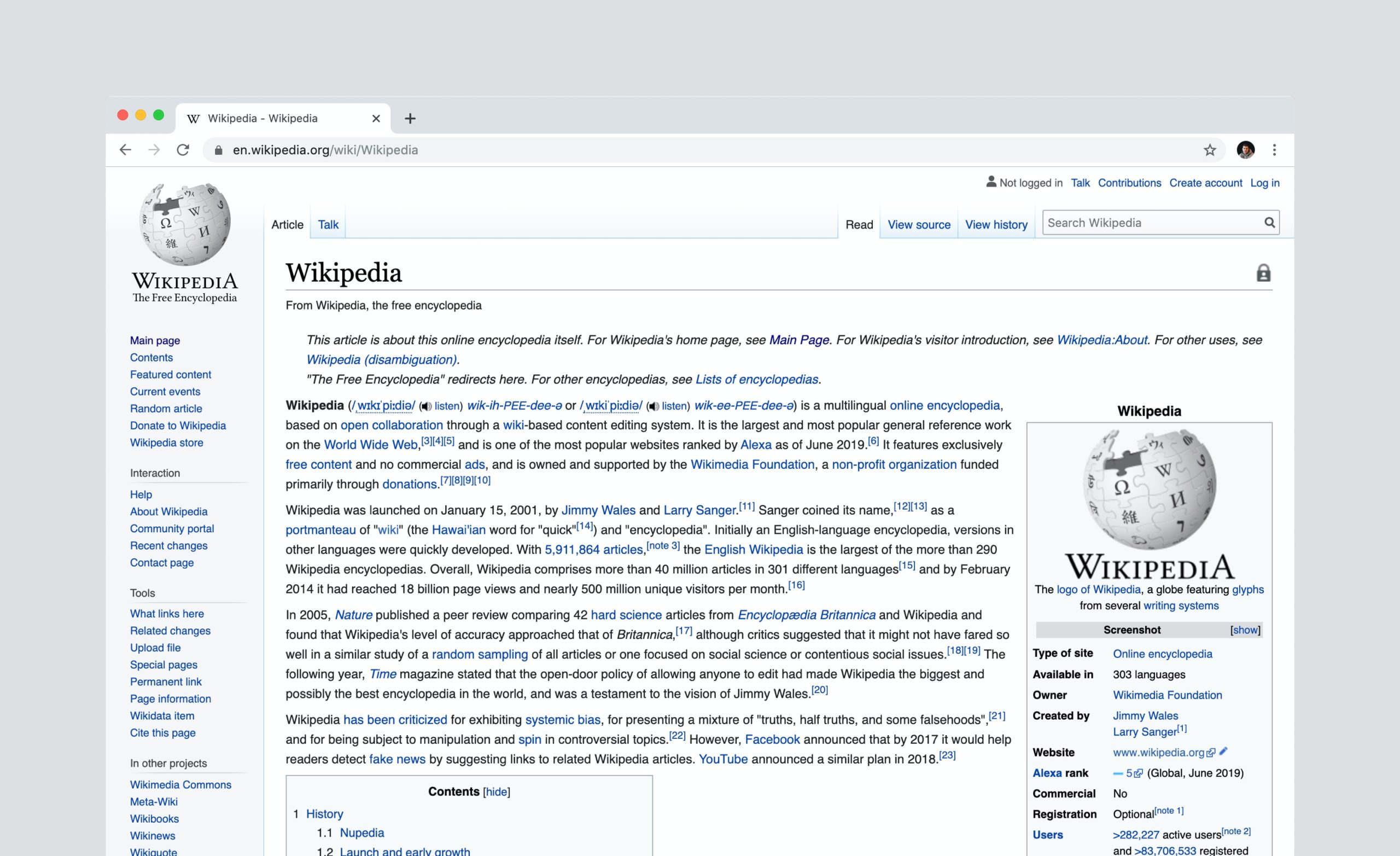Wikipedia, the internet’s go-to source for information, is not only a treasure trove of knowledge but also a valuable resource for building backlinks to your website. In the world of search engine optimization (SEO), backlinks from authoritative websites can significantly boost your site’s visibility and credibility. However, getting backlinks from Wikipedia is no easy feat—it requires strategy, diligence, and an understanding of Wikipedia’s strict editorial guidelines. In this comprehensive guide, we will unravel the mystery behind securing backlinks from Wikipedia and provide you with clear steps to navigate this complex process successfully.
What are Backlinks?
Backlinks are an essential part of a website’s success in the digital realm. These links act as virtual endorsements, connecting one website to another and signaling to search engines that the linked content is valuable and credible. They serve as pathways for users, guiding them from one site to another while also enhancing the authority and trustworthiness of the linked page. However, not all backlinks are created equal; quality outweighs quantity when it comes to these connections. Websites with high domain authority that provide relevant, authoritative content offer more valuable backlinks than those with low credibility.
Acquiring backlinks from reputable sources takes time and effort, but the benefits can be significant. Wikipedia stands out as an influential platform for building robust backlinks due to its high authority and strict editorial guidelines. However, securing a backlink from this renowned online encyclopedia requires meticulous research and adherence to Wikipedia’s rigorous standards for neutrality and verifiability. By crafting well-researched, fact-based content that aligns with Wikipedia’s policies, website owners can increase their chances of earning a valuable link from this revered source.
By understanding the importance of backlinks in enhancing a website’s credibility and employing strategic methods for acquiring links from respected sources such as Wikipedia, website owners can elevate their online presence while boosting their search engine rankings. This process demands patience, dedication, and a commitment to creating high-quality content that adds genuine value to users’ online experiences.

Benefits of Getting Backlinks from Wikipedia
Getting backlinks from Wikipedia can have a significant impact on your website’s search engine optimization and overall online visibility. Wikipedia is highly regarded by search engines like Google, so receiving a backlink from this reputable source can greatly enhance your website’s authority. Backlinks from Wikipedia are seen as trustworthy and reliable, which can positively influence your site’s ranking in search results.
In addition to improving your website’s SEO, backlinks from Wikipedia also drive valuable traffic to your site. As one of the most visited websites in the world, Wikipedia has millions of daily users who often click on external links for further information. This means that a well-placed backlink on relevant Wikipedia pages can generate a steady stream of organic traffic to your website, potentially increasing its exposure and bringing in new visitors who are genuinely interested in what you have to offer.
Understanding Wikipedia’s Notability Guidelines
Understanding Wikipedia’s notability guidelines is crucial for anyone seeking to secure backlinks from the platform. Wikipedia has strict criteria for determining whether a topic meets the threshold of notability required for inclusion on the site. Notability is established through significant coverage in reliable, independent sources. This means that simply having a website or being mentioned in passing by a few news outlets may not be enough to meet Wikipedia’s stringent standards.
Furthermore, it’s important to note that personal accomplishments and achievements are generally not considered sufficient grounds for notability on Wikipedia. Instead, the focus is on broader recognition and coverage within reputable publications or media outlets. By understanding and abiding by these notability guidelines, individuals and organizations can better position themselves to successfully contribute valuable content to Wikipedia while also building high-quality backlinks to their own websites. This requires a strategic approach that emphasizes substance over self-promotion, ultimately benefiting both Wikipedia users and content creators alike.

Researching Relevant Wikipedia Pages
Researching relevant Wikipedia pages is a crucial step towards acquiring backlinks from this authoritative platform. When exploring potential pages for backlink opportunities, consider the content’s relevance to your website or blog. Look for articles that align with your niche and have a substantial amount of traffic, as these are more likely to provide valuable backlinks. It’s also important to note the page’s existing external links and their placement, as this can help you understand the site’s linking policies and optimize your approach.
Moreover, analyzing the editing history of the Wikipedia page can offer valuable insights into its stability and credibility. By reviewing past revisions and discussions, you can gauge whether the page receives regular updates and maintain consistent quality. Additionally, it’s advisable to assess the engagement levels on the Talk page to understand how active editors are in maintaining its accuracy. This level of research ensures that you target high-quality pages that align with your content while adhering to Wikipedia’s guidelines, increasing your chances of successfully securing backlinks from this reputable source.
Crafting a Compelling and Accurate Citation
Crafting a compelling and accurate citation is crucial when aiming to secure backlinks from Wikipedia. First, it’s essential to thoroughly research the information you wish to cite, ensuring its accuracy and relevance to the topic at hand. Providing verifiable sources adds credibility to your content and increases the likelihood of acceptance by Wikipedia editors.
Next, consider the formatting and style guidelines outlined by Wikipedia for citations. Following these guidelines not only ensures consistency within the platform but also demonstrates respect for the community’s standards, increasing your chances of approval. Additionally, utilizing reputable sources such as academic journals, books, or news publications strengthens your citation’s reliability and enhances its appeal to editors reviewing your proposed backlink. By carefully crafting a compelling and accurate citation that aligns with Wikipedia’s standards, you can significantly increase your chances of successfully securing valuable backlinks from this authoritative platform.

Submitting Your Citation for Approval
Submitting your citation for approval on Wikipedia can be a complex process, but it’s crucial for obtaining valuable backlinks. Wikipedia has strict guidelines when it comes to adding citations and links, so it’s important to do thorough research before submitting. One key factor to consider is the notability of the source you’re citing – Wikipedia requires that sources be from reputable and reliable publications. Additionally, make sure that the content you’re referencing is directly related to the topic on which you want to add a backlink.
When submitting your citation for approval, be prepared to provide detailed information about the source, including its author, publication date, and credibility. It’s also essential to follow Wikipedia’s formatting guidelines for citations and ensure that your submission complies with their editorial standards. By taking the time to thoroughly understand and adhere to these requirements, you can increase your chances of getting your citation approved and ultimately secure valuable backlinks from one of the most authoritative websites on the internet.
Conclusion: Enhancing SEO with Wikipedia Backlinks
In conclusion, leveraging Wikipedia backlinks can significantly enhance your website’s SEO performance. By creating high-quality, relevant content and obtaining legitimate citations from reputable sources, including Wikipedia, you can improve your site’s authority and trustworthiness in the eyes of search engines. The key lies in contributing valuable information to Wikipedia pages while adhering to their guidelines and avoiding any promotional or biased content. This approach not only helps to boost your backlink profile but also fosters a positive relationship with the Wikipedia community.
Moreover, Wikipedia backlinks can drive significant traffic to your website, particularly if your content provides comprehensive and accurate information on a particular topic. As an authoritative source of information for many internet users, having your website cited on relevant Wikipedia pages can lead to increased visibility and credibility within your industry niche. Ultimately, by approaching this strategy with integrity and a commitment to adding value to the collective knowledge base, you can organically enhance your SEO efforts through the acquisition of quality backlinks from the world’s most renowned online encyclopedia.










